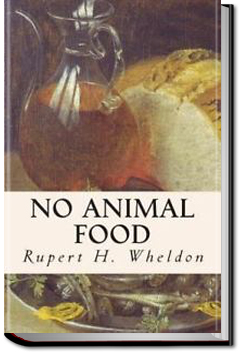

We deduce from these postulates the following ethical precepts: a wise man will, firstly, so regulate his conduct that thereby he may experience the greatest happiness; secondly, he will endeavour to bestow happiness on others that by so doing he may receive, indirectly, being himself a part of the Cosmic Whole, the happiness he gives. Thus supreme selfishness is synonymous with supreme egoism, a truth that can only be stated paradoxically.
Applying this latter precept to the matter in hand, it is obvious that since we should so live as to give the greatest possible happiness to all[Pg 37] beings capable of appreciating it, and as it is an indisputable fact that animals can suffer pain, and that men who slaughter animals needlessly suffer from atrophy of all finer feelings, we should therefore cause no unnecessary suffering in the animal world. Let us then consider whether, knowing flesh to be unnecessary as an article of diet, we are, in continuing to demand and eat flesh-food, acting morally or not. To answer this query is not difficult.
It is hardly necessary to say that we are causing a grea
Get ALL YOU CAN BOOKS absolutely FREE for 30 days. Download our FREE app and enjoy unlimited downloads of our entire library with no restrictions.
Have immediate access and unlimited downloads to over 200,000 books, courses, podcasts, and more with no restrictions.
Everything you download during your trial is yours to keep and enjoy for free, even if you cancel during the trial. Cancel Anytime. No risk. No obligations.
For just $24.99 per month, you can continue to have unlimited access to our entire library. To put that into perspective, most other services charge the same amount for just one book!

As avid readers, we understand the joy of immersing ourselves in a captivating story or getting lost in the pages of a good book. That's why we founded All You Can Books back in 2010, to create a platform where people can access an extensive library of quality content and discover new favorites.
Since our founding days, we’ve continuously added to our vast library and currently have over 200,000 titles, including ebooks, audiobooks, language learning courses, podcasts, bestseller summaries, travel books, and more! Our goal at All You Can Books is to ensure we have something for everyone.
Join our community of book lovers and explore the world of literature and beyond!